Pyromaniacs
Setting the World on FIre
News in this category: 18
Bookmark and share this category:
News
A note from Dan PhillipsAfter about seven years without a post, I posted a copy of a letter I sent to the congregation I serve in Houston, Texas. I wanted to help parents talk with their children about the ubiquitous "Pride Month" intrusions. Then I followed up with a sermon. But someone flagged it to Blogger, where it was ruled that my post was "Hate Speech." Their definition: "content that promotes or condones violence against or has the primary purpose of inciting hatred against an individual or group on the basis of their …sexual orientation, gender, gender identity, or any other characteristic that is associated with systemic discrimination or marginalization." This, of a post that literally says "we don't hate people who want bad things…. We love people who don't know Jesus…" But today, to believe in the actual Jesus is to be called a "hater." You will find my letter posted elsewhere, unedited. Click HERE to read the post Blogger tried to censor.
  |
by Phil Johnson
  do of course, wholeheartedly affirm the principles of Romans 13:1-7 ("be in subjection to the governing authorities") and 1 Peter 2:13-17 ("Submit yourselves for the Lord's sake to every human institution")—while recognizing also that those commands are limited by the principle of Acts 5:29 ("We must obey God rather than men").If you believe the threat to public health is real and deadly, you'll probably be inclined to submit to all the governor's orders. If you suspect politicians are milking the entire thing and exaggerating the threat for partisan purposes, you're more likely to conclude that the duty of Hebrews 10:25 outweighs any obligation to kowtow to the governor's latest whim.Circumstances surrounding the current quarantine, riots, and mass political demonstrations have greatly blurred the question of whether Acts 5:29 applies in this case. Good, Bible-believing Christians have landed on both sides of the question. If you believe the threat to public health is real and deadly, you'll probably be inclined to submit to all the governor's orders. If you suspect politicians are milking the entire thing and exaggerating the threat for partisan purposes, you're more likely to conclude that the duty of Hebrews 10:25 outweighs any obligation to kowtow to the governor's latest whim.During more than 16 weeks of quarantine (with the death toll just a sparse fraction of what experts originally predicted) the elders and staff of Grace Community Church observed every order related to the quarantine. But the rules change almost daily and are being applied unfairly. Statistically, people are far more likely to get the virus in a gym or a bar than in a worship service. (Of 3+ million cases in the US since March, only 650 have been traceable to churches.) Yet bars, gyms, gambling casinos, and even massage parlors have been given freedoms that are withheld from churches. In fact, as these and other businesses are finally being permitted to reopen, restrictions targeting churches are becoming even more onerous. The California Governor has gone so far as to tell churches they must cease all congregational singing. do of course, wholeheartedly affirm the principles of Romans 13:1-7 ("be in subjection to the governing authorities") and 1 Peter 2:13-17 ("Submit yourselves for the Lord's sake to every human institution")—while recognizing also that those commands are limited by the principle of Acts 5:29 ("We must obey God rather than men").If you believe the threat to public health is real and deadly, you'll probably be inclined to submit to all the governor's orders. If you suspect politicians are milking the entire thing and exaggerating the threat for partisan purposes, you're more likely to conclude that the duty of Hebrews 10:25 outweighs any obligation to kowtow to the governor's latest whim.Circumstances surrounding the current quarantine, riots, and mass political demonstrations have greatly blurred the question of whether Acts 5:29 applies in this case. Good, Bible-believing Christians have landed on both sides of the question. If you believe the threat to public health is real and deadly, you'll probably be inclined to submit to all the governor's orders. If you suspect politicians are milking the entire thing and exaggerating the threat for partisan purposes, you're more likely to conclude that the duty of Hebrews 10:25 outweighs any obligation to kowtow to the governor's latest whim.During more than 16 weeks of quarantine (with the death toll just a sparse fraction of what experts originally predicted) the elders and staff of Grace Community Church observed every order related to the quarantine. But the rules change almost daily and are being applied unfairly. Statistically, people are far more likely to get the virus in a gym or a bar than in a worship service. (Of 3+ million cases in the US since March, only 650 have been traceable to churches.) Yet bars, gyms, gambling casinos, and even massage parlors have been given freedoms that are withheld from churches. In fact, as these and other businesses are finally being permitted to reopen, restrictions targeting churches are becoming even more onerous. The California Governor has gone so far as to tell churches they must cease all congregational singing.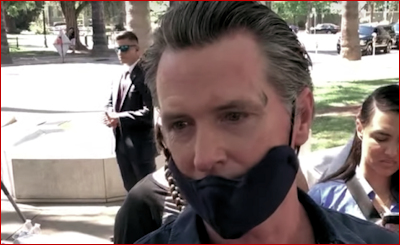 Governor Newsom: Unclear on the Concept.(It's supposed to be a mask, not a chin strap.)Our elders and security team cannot in good conscience become enforcers of rules that 1) we believe unfairly target the church, and 2) the government itself has declined to enforce. Owing to the arbitrary, capricious way these regulations are made and changed, combined with the fact that authorities did nothing (and are doing nothing) to enforce the masks-and-social-distancing rules on political demonstrators who gather regularly in downtown L. A. in crowds of thousands, it seems only right to leave the question of how far to go in observing social-distancing recommendations up to each individual. The degree to which we permit masks and social-distancing recommendations to impinge on our worship in the congregational context ought to be seen as a matter of conscience. "Each person must be fully convinced in his own mind" (Romans 14:5).In other words, the degree to which we permit masks and social-distancing recommendations to impinge on our worship in the congregational context ought to be seen as a matter of conscience. "Each person must be fully convinced in his own mind" (Romans 14:5). And don't be quick to condemn believers who hold a different opinion, no matter which side of the issue you have come down on.Grace Church's elders have made it possible for people with scrupulous consciences to obey every government-issued regulation to the letter. The church provides masks and hand cleanser at stations around campus, and there are ample outdoor seating spaces where people can hear the sermon, participate in the singing, and still practice careful social distancing if they are bound by conscience to do so.On the other hand, for those (like me) who are not fearful of exposure to the virus, or those who are deeply skeptical of the motives behind this level of government intrusion, they can likewise do what their conscience dictates and gather in the auditorium for worship as usual—with or without masks. If government officials choose to single those people out and enforce rules they aren't enforcing at political demonstrations, let them do so. I for one am willing to suffer the consequences if it comes to that. Governor Newsom: Unclear on the Concept.(It's supposed to be a mask, not a chin strap.)Our elders and security team cannot in good conscience become enforcers of rules that 1) we believe unfairly target the church, and 2) the government itself has declined to enforce. Owing to the arbitrary, capricious way these regulations are made and changed, combined with the fact that authorities did nothing (and are doing nothing) to enforce the masks-and-social-distancing rules on political demonstrators who gather regularly in downtown L. A. in crowds of thousands, it seems only right to leave the question of how far to go in observing social-distancing recommendations up to each individual. The degree to which we permit masks and social-distancing recommendations to impinge on our worship in the congregational context ought to be seen as a matter of conscience. "Each person must be fully convinced in his own mind" (Romans 14:5).In other words, the degree to which we permit masks and social-distancing recommendations to impinge on our worship in the congregational context ought to be seen as a matter of conscience. "Each person must be fully convinced in his own mind" (Romans 14:5). And don't be quick to condemn believers who hold a different opinion, no matter which side of the issue you have come down on.Grace Church's elders have made it possible for people with scrupulous consciences to obey every government-issued regulation to the letter. The church provides masks and hand cleanser at stations around campus, and there are ample outdoor seating spaces where people can hear the sermon, participate in the singing, and still practice careful social distancing if they are bound by conscience to do so.On the other hand, for those (like me) who are not fearful of exposure to the virus, or those who are deeply skeptical of the motives behind this level of government intrusion, they can likewise do what their conscience dictates and gather in the auditorium for worship as usual—with or without masks. If government officials choose to single those people out and enforce rules they aren't enforcing at political demonstrations, let them do so. I for one am willing to suffer the consequences if it comes to that. |
by Phil Johnson
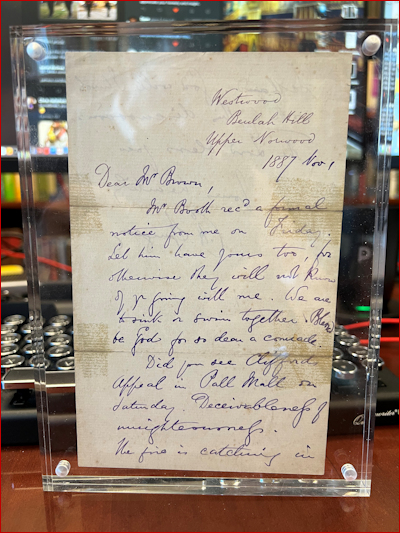 (Click for a hi-res image.) (Click for a hi-res image.) n October 28, 1887 (a Friday)—well into the Down Grade controversy—Charles Spurgeon wrote the Secretary of the Baptist union to withdraw his membership in the Union.The following Tuesday, November 1, he hand-wrote this letter to his friend Archibald Brown, urging him to withdraw from the Union as well:WestwoodBeulah HillUpper Norwood 1887 Nov 1 Dear Mr Brown,Mr. Booth recd a formal notice from me on Friday. Let him have yours too, for otherwise they will not know of yr going with me. We are to sink or swim together. Blessed be God for so dear a comrade. Did you see Clifford's Appeal in Pall Mall on Saturday? Deceivableness of unrighteousness!" The fire is catching in Scotland. God will I trust work by this discussion. The Lord bless you Yours HeartilyC. H. SpurgeonMy most treasured item of historic Baptist memorabilia is the handwritten original of that letter. Some details about the context: n October 28, 1887 (a Friday)—well into the Down Grade controversy—Charles Spurgeon wrote the Secretary of the Baptist union to withdraw his membership in the Union.The following Tuesday, November 1, he hand-wrote this letter to his friend Archibald Brown, urging him to withdraw from the Union as well:WestwoodBeulah HillUpper Norwood 1887 Nov 1 Dear Mr Brown,Mr. Booth recd a formal notice from me on Friday. Let him have yours too, for otherwise they will not know of yr going with me. We are to sink or swim together. Blessed be God for so dear a comrade. Did you see Clifford's Appeal in Pall Mall on Saturday? Deceivableness of unrighteousness!" The fire is catching in Scotland. God will I trust work by this discussion. The Lord bless you Yours HeartilyC. H. SpurgeonMy most treasured item of historic Baptist memorabilia is the handwritten original of that letter. Some details about the context: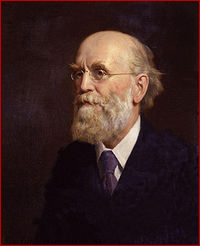 "Clifford" is John Clifford, who had written an unctuous "Appeal to Mr. Spurgeon" in the Saturday edition of The Pall Mall Gazette. (That article is what Spurgeon is referring to in his letter to Brown.)Clifford was serving at the time as Vice-President of the Baptist Union. A year later he would be elected president, and in that role he would preside over the Baptist Union's infamous censure of Spurgeon. In his mostly excellent biography of Spurgeon, W. Y. Fullerton charitably tries to portray Clifford as "one of Mr. Spurgeon's most ardent admirers." He was anything but. He was analogous to those who call themselves "progressive" today.When Clifford first came to London at the age of 20 in 1856, he came to the city specifically to hear Spurgeon. But even in those days, Clifford was hardly a solid Bible-believing evangelical. He was enthralled with Ralph Waldo Emerson and had seriously contemplated becoming a Unitarian. Ultimately, however, he remained at least nominally evangelical and in 1858 took a position as pastor of the Praed Street Baptist Church in London, where he remained until his retirement in 1915.By the late 1880s, Clifford had concluded that Spurgeon and the brand of evangelical conviction he represented were oldfangled and out of fashion—and Clifford thus helped lead the modernist effort to silence Spurgeon's concerns about doctrinal down grade. Tom Nettles describes Clifford as an "irrepressible liberal. Personally, I like Spurgeon's description of Clifford's passive-aggressive approach to Spurgeon and the Down Grade: "Deceivableness of unrighteousness!"A month later, Spurgeon wrote the secretary of the Baptist Union Council, declining the council's plea for him to reconsider his resignation. In that letter, Spurgeon said candidly, "I regard full-grown 'modern thought' as a totally new cult, having no more relation to Christianity than the mist of the evening to the everlasting hills." "Clifford" is John Clifford, who had written an unctuous "Appeal to Mr. Spurgeon" in the Saturday edition of The Pall Mall Gazette. (That article is what Spurgeon is referring to in his letter to Brown.)Clifford was serving at the time as Vice-President of the Baptist Union. A year later he would be elected president, and in that role he would preside over the Baptist Union's infamous censure of Spurgeon. In his mostly excellent biography of Spurgeon, W. Y. Fullerton charitably tries to portray Clifford as "one of Mr. Spurgeon's most ardent admirers." He was anything but. He was analogous to those who call themselves "progressive" today.When Clifford first came to London at the age of 20 in 1856, he came to the city specifically to hear Spurgeon. But even in those days, Clifford was hardly a solid Bible-believing evangelical. He was enthralled with Ralph Waldo Emerson and had seriously contemplated becoming a Unitarian. Ultimately, however, he remained at least nominally evangelical and in 1858 took a position as pastor of the Praed Street Baptist Church in London, where he remained until his retirement in 1915.By the late 1880s, Clifford had concluded that Spurgeon and the brand of evangelical conviction he represented were oldfangled and out of fashion—and Clifford thus helped lead the modernist effort to silence Spurgeon's concerns about doctrinal down grade. Tom Nettles describes Clifford as an "irrepressible liberal. Personally, I like Spurgeon's description of Clifford's passive-aggressive approach to Spurgeon and the Down Grade: "Deceivableness of unrighteousness!"A month later, Spurgeon wrote the secretary of the Baptist Union Council, declining the council's plea for him to reconsider his resignation. In that letter, Spurgeon said candidly, "I regard full-grown 'modern thought' as a totally new cult, having no more relation to Christianity than the mist of the evening to the everlasting hills." |
by Phil Johnson
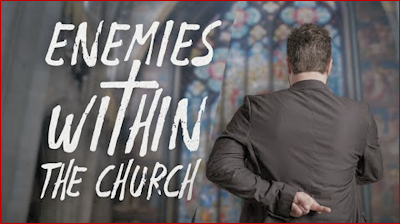  finally had an opportunity to see the documentary "Enemies Within the Church," and as promised, here is a candid review: finally had an opportunity to see the documentary "Enemies Within the Church," and as promised, here is a candid review: |
by Phil Johnson
  e regard the wearing of masks in worship first of all as a matter of conscience—and since we are forbidden by the teaching of Christ not to make extrabiblical religious rules that bind men's consciences (Matthew 23:1-7; 15:1-9), we neither mandate nor forbid the wearing of masks in worship. e regard the wearing of masks in worship first of all as a matter of conscience—and since we are forbidden by the teaching of Christ not to make extrabiblical religious rules that bind men's consciences (Matthew 23:1-7; 15:1-9), we neither mandate nor forbid the wearing of masks in worship. Veils and face coverings have profound religious significance in many world religions. Indeed, much of the rhetoric surrounding COVID masks (even among evangelical Christians) describes them as symbols of personal piety. Serious questions about the usefulness, effectiveness, or medical necessity of masks are routinely dismissed or swept aside, and people are told to wear them simply because they are a tangible, visible means of showing love for one's neighbor. This rationale is pressed on people's consciences regardless of whether it can be proved statistically that they really safeguard anyone from the virus, and irrespective of the fact that masks can cause other medical problems. But COVID masks have become, in effect, secularism's substitute for religious vestments. No one can reasonably deny that face coverings have become the chief symbol of popular culture's sanctimonious devotion to the secularist credo.But one of the distinctives of Christian worship is face-to-face fellowship. Koinonia is the Greek expression the New Testament uses to describe it. The word conveys the idea of community, close association, and intimate social contact. Thus the apostle's instructions: "Greet one another with a holy kiss" are repeated four times in the Pauline epistles (Romans 16:16; 1 Corinthians 16:20; 2 Corinthians 13:12; 1 Thessalonians 5:22).The importance of face-to-face koinonia is stressed repeatedly. Paul writes, "We . . . were all the more eager with great desire to see your face" (1 Thessalonians 2:17). "We night and day keep praying most earnestly that we may see your face" (3:10). The apostle John writes, "I hope to come to you and speak face to face, so that your joy may be made full" (2 John 12). "I hope to see you shortly, and we will speak face to face" (3 John 14).Worship, in particular, is best seen as an open-face discipline. Covering the face is a symbol of disgrace or shame (Jeremiah 51:51; Job 40:4). Concealing one's mouth while praising God suppresses the visible expression of worship. The Psalms' calls to worship are filled with the words "tongue," "lips," and "mouth." "Sing aloud unto God our strength: make a joyful noise" (Psalm 81:1). " Wholehearted worship cannot be sung as intended—unrestrained and unmuted—from behind a state-mandated face covering. We see "the Light of the knowledge of the glory of God in the face of Christ" (4:6), and our faces were designed by him to reflect that glory back to heaven in uninhibited praise.It is true, of course, that for now, "We see in a mirror dimly, but [someday] face to face" (1 Corinthians 13:2). That speaks of a face-to-face encounter with Christ himself, when we will be brought into the fullness of knowledge and moral perfection. John the apostle says, "We know that when He appears, we will be like Him, because we will see Him just as He is" (1 John 3:2).Despite the temporary limitation of seeing heaven's glory as if we were looking in a dim mirror, we nevertheless are privileged as Christians to have a view of divine glory that is superior to what Moses and the Israelites enjoyed at Sinai. We see God's glory revealed in Christ—"glory as of the only begotten from the Father, full of grace and truth" (John 1:14). Unlike Moses, who was shielded in the cleft of a rock from seeing the full display of divine glory; and unlike the Israelites, who only saw the fading reflection of glory on Moses' face (and even that was covered with a veil) we see Christ so clearly revealed that it is as if we are looking in the very face of God's glory. "We all, with unveiled face, beholding as in a mirror the glory of the Lord, are being transformed into the same image from glory to glory" (2 Corinthians 3:18). Again: we see "the glory of God in the face of Christ" (4:6).Yes, the language of that biblical passage is symbolic. We don't literally see the face of Christ physically. For now, we see him as he is revealed on the pages of the New Testament. But the symbolism embodied in Paul's description of seeing him with "unveiled face" is important, and the wearing of masks—especially government-mandated masks that serve as the vestments of secular religion—feels like a covert attempt to erase one of the core truths that makes Christianity unique.Those are my personal convictions about masks. It's not a dogma we teach. It's certainly not a rule we expect people in the church to swear fidelity to. Again, we don't want to bind anyone's conscience with manmade restrictions. We especially do not want to shame the person who wears a mask purely because he or she genuinely believes the current orthodoxy about masks as an effective shield against viral transmission. People in the church are free to wear masks if they choose. But people who share the above view are likewise free to worship, sing, pray, and proclaim God's Word without a face covering—even if that goes against the vacillating, sometimes arbitrary, and frequently heavy-handed dictates of government officials. It is simply not the church's duty to enforce executive orders based on a politician's whimsy—particularly when those edicts impinge on our freedom of worship. Veils and face coverings have profound religious significance in many world religions. Indeed, much of the rhetoric surrounding COVID masks (even among evangelical Christians) describes them as symbols of personal piety. Serious questions about the usefulness, effectiveness, or medical necessity of masks are routinely dismissed or swept aside, and people are told to wear them simply because they are a tangible, visible means of showing love for one's neighbor. This rationale is pressed on people's consciences regardless of whether it can be proved statistically that they really safeguard anyone from the virus, and irrespective of the fact that masks can cause other medical problems. But COVID masks have become, in effect, secularism's substitute for religious vestments. No one can reasonably deny that face coverings have become the chief symbol of popular culture's sanctimonious devotion to the secularist credo.But one of the distinctives of Christian worship is face-to-face fellowship. Koinonia is the Greek expression the New Testament uses to describe it. The word conveys the idea of community, close association, and intimate social contact. Thus the apostle's instructions: "Greet one another with a holy kiss" are repeated four times in the Pauline epistles (Romans 16:16; 1 Corinthians 16:20; 2 Corinthians 13:12; 1 Thessalonians 5:22).The importance of face-to-face koinonia is stressed repeatedly. Paul writes, "We . . . were all the more eager with great desire to see your face" (1 Thessalonians 2:17). "We night and day keep praying most earnestly that we may see your face" (3:10). The apostle John writes, "I hope to come to you and speak face to face, so that your joy may be made full" (2 John 12). "I hope to see you shortly, and we will speak face to face" (3 John 14).Worship, in particular, is best seen as an open-face discipline. Covering the face is a symbol of disgrace or shame (Jeremiah 51:51; Job 40:4). Concealing one's mouth while praising God suppresses the visible expression of worship. The Psalms' calls to worship are filled with the words "tongue," "lips," and "mouth." "Sing aloud unto God our strength: make a joyful noise" (Psalm 81:1). " Wholehearted worship cannot be sung as intended—unrestrained and unmuted—from behind a state-mandated face covering. We see "the Light of the knowledge of the glory of God in the face of Christ" (4:6), and our faces were designed by him to reflect that glory back to heaven in uninhibited praise.It is true, of course, that for now, "We see in a mirror dimly, but [someday] face to face" (1 Corinthians 13:2). That speaks of a face-to-face encounter with Christ himself, when we will be brought into the fullness of knowledge and moral perfection. John the apostle says, "We know that when He appears, we will be like Him, because we will see Him just as He is" (1 John 3:2).Despite the temporary limitation of seeing heaven's glory as if we were looking in a dim mirror, we nevertheless are privileged as Christians to have a view of divine glory that is superior to what Moses and the Israelites enjoyed at Sinai. We see God's glory revealed in Christ—"glory as of the only begotten from the Father, full of grace and truth" (John 1:14). Unlike Moses, who was shielded in the cleft of a rock from seeing the full display of divine glory; and unlike the Israelites, who only saw the fading reflection of glory on Moses' face (and even that was covered with a veil) we see Christ so clearly revealed that it is as if we are looking in the very face of God's glory. "We all, with unveiled face, beholding as in a mirror the glory of the Lord, are being transformed into the same image from glory to glory" (2 Corinthians 3:18). Again: we see "the glory of God in the face of Christ" (4:6).Yes, the language of that biblical passage is symbolic. We don't literally see the face of Christ physically. For now, we see him as he is revealed on the pages of the New Testament. But the symbolism embodied in Paul's description of seeing him with "unveiled face" is important, and the wearing of masks—especially government-mandated masks that serve as the vestments of secular religion—feels like a covert attempt to erase one of the core truths that makes Christianity unique.Those are my personal convictions about masks. It's not a dogma we teach. It's certainly not a rule we expect people in the church to swear fidelity to. Again, we don't want to bind anyone's conscience with manmade restrictions. We especially do not want to shame the person who wears a mask purely because he or she genuinely believes the current orthodoxy about masks as an effective shield against viral transmission. People in the church are free to wear masks if they choose. But people who share the above view are likewise free to worship, sing, pray, and proclaim God's Word without a face covering—even if that goes against the vacillating, sometimes arbitrary, and frequently heavy-handed dictates of government officials. It is simply not the church's duty to enforce executive orders based on a politician's whimsy—particularly when those edicts impinge on our freedom of worship. |
by Phil Johnson
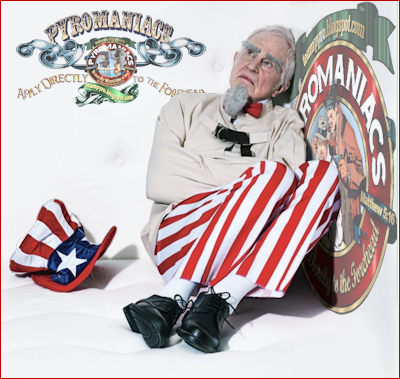 Note (31 Aug 2021):I wrote this post last year to answer some evangelical critics who insisted that our church could easily follow all government-mandated shutdown protocols without sacrificing our freedoms or compromising our worship. Almost as soon as I posted it, the attorneys handling the church's court case asked us to refrain from discussing the case online—to make sure the legal argument they were making did not get clouded by a social-media debate. So I removed the post. Now that the legal case has been settled, here is that information. Internal links will take you to documentation that proves what an impossible burden the government-mandated restrictions imposed on the church.(This is kind of long. Pack a lunch.) For the past eight weeks or longer, Sunday morning worship services at Grace Community Church have been open to anyone who wants to attend. John MacArthur and the elders made that fact as public as possible in a statement they issued on July 24, saying they would continue to have normal worship services despite a July 13 edict from the California Governor ordering churches to close again after a brief respite from the original quarantine. Note (31 Aug 2021):I wrote this post last year to answer some evangelical critics who insisted that our church could easily follow all government-mandated shutdown protocols without sacrificing our freedoms or compromising our worship. Almost as soon as I posted it, the attorneys handling the church's court case asked us to refrain from discussing the case online—to make sure the legal argument they were making did not get clouded by a social-media debate. So I removed the post. Now that the legal case has been settled, here is that information. Internal links will take you to documentation that proves what an impossible burden the government-mandated restrictions imposed on the church.(This is kind of long. Pack a lunch.) For the past eight weeks or longer, Sunday morning worship services at Grace Community Church have been open to anyone who wants to attend. John MacArthur and the elders made that fact as public as possible in a statement they issued on July 24, saying they would continue to have normal worship services despite a July 13 edict from the California Governor ordering churches to close again after a brief respite from the original quarantine. |
by Phil Johnson (and friends)
  ome friends and I collected common questions that have been raised regarding the recent statement from John MacArthur and the Elders of Grace Community Church, titled "Christ, Not Caesar, Is Head of the Church." Here's our FAQ in its current form:1.Why did you consent to the original government order, citing Romans 13 and 1 Peter 2? ome friends and I collected common questions that have been raised regarding the recent statement from John MacArthur and the Elders of Grace Community Church, titled "Christ, Not Caesar, Is Head of the Church." Here's our FAQ in its current form:1.Why did you consent to the original government order, citing Romans 13 and 1 Peter 2? |
. . . and so much the more as you see the Day approaching.by Phil Johnson
  avin Ortlund has written a blogpost titled "Should Churches in California Defy Government Restrictions? A Response to John MacArthur." Time won't permit me to go through his entire post, but I want to clarify one point that Ortlund gets wrong, because it's a crucial one, and I've seen it repeated several times on Twitter. (I've even had a couple of angry emails from people who think John MacArthur said what Ortlund claims he said.) Since it's the starting point of Ortlund's blogpost, much of what he writes in the piece hinges on his misunderstanding of a partial quote he has pulled from MacArthur.Ortlund writes, for example, "To claim that those complying with the government restrictions 'don't know what a church is and . . . don't shepherd their people' is both unhelpful and unkind" (italics added). MacArthur made no such blanket statement, but Ortlund seems to believe that's what he meant, and Ortlund feels personally targeted by it.Here's what John MacArthur did say, with a little bit of context:Churches are shutting down. Large churches are shutting down until (they say) January. I don't have any way to understand that—other than they don't know what a church is and they don't shepherd their people. But that's sad. And you have a lot of people in Christianity who seem to be significant leaders who aren't giving any strength and courage to the church. They're not standing up and rising up and calling on Christians to be the church in the world.—John MacArthur (2 August 2020)As the context plainly shows, Pastor MacArthur was talking about pastors who are doing what Andy Stanley and JD Greear have done—namely, they have stopped gathering as a church and made small home groups a long-term substitute for congregational worship. And they say they have no intention of re-gathering the whole flock until sometime in 2021.MacArthur's remark was not about masks and social distancing. It wasn't aimed at churches that have continued to gather the flock by moving their services outdoors or off site. And let's be clear: That would exclude Gavin Ortlund from MacArthur's censure. In his blogpost, Ortlund himself says, "Our church has chosen to meet outdoors." Wonderful. He is to be commended for that. But would Pastor Ortlund not actually agree that it would reflect an unbiblical notion of what the church should be if he had given up on the duty spelled out in Hebrews 10:25—which (by the way) Ortlund himself lists first in his list of "four biblical values that should inform our decision-making in this situation"?No one who is making a good-faith effort not to forsake the regular assembly has any cause to feel insulted by John MacArthur's comment. I'm convinced that no one who is listening carefully to what Pastor MacArthur is saying (and what he has said—repeatedly—about Grace Church's response to the indefinite extension of the quarantine in California) has any cause to feel targeted—unless they are arguing that long-term closure of churches is the right response to the pandemic.I admit, it did surprise me last week when Jonathan Leeman, Editorial Director of the 9Marks ministry, indicated he appreciated JD Greear's approach, implying that canceling congregational worship for the rest of the year is a viable (perhaps even better) answer to the quarantine than John MacArthur's decision simply to open the doors of the church and allow the congregation to come. Leeman himself had previously written an excellent article, "The Church Gathered," defending the priority of the congregational assembly. avin Ortlund has written a blogpost titled "Should Churches in California Defy Government Restrictions? A Response to John MacArthur." Time won't permit me to go through his entire post, but I want to clarify one point that Ortlund gets wrong, because it's a crucial one, and I've seen it repeated several times on Twitter. (I've even had a couple of angry emails from people who think John MacArthur said what Ortlund claims he said.) Since it's the starting point of Ortlund's blogpost, much of what he writes in the piece hinges on his misunderstanding of a partial quote he has pulled from MacArthur.Ortlund writes, for example, "To claim that those complying with the government restrictions 'don't know what a church is and . . . don't shepherd their people' is both unhelpful and unkind" (italics added). MacArthur made no such blanket statement, but Ortlund seems to believe that's what he meant, and Ortlund feels personally targeted by it.Here's what John MacArthur did say, with a little bit of context:Churches are shutting down. Large churches are shutting down until (they say) January. I don't have any way to understand that—other than they don't know what a church is and they don't shepherd their people. But that's sad. And you have a lot of people in Christianity who seem to be significant leaders who aren't giving any strength and courage to the church. They're not standing up and rising up and calling on Christians to be the church in the world.—John MacArthur (2 August 2020)As the context plainly shows, Pastor MacArthur was talking about pastors who are doing what Andy Stanley and JD Greear have done—namely, they have stopped gathering as a church and made small home groups a long-term substitute for congregational worship. And they say they have no intention of re-gathering the whole flock until sometime in 2021.MacArthur's remark was not about masks and social distancing. It wasn't aimed at churches that have continued to gather the flock by moving their services outdoors or off site. And let's be clear: That would exclude Gavin Ortlund from MacArthur's censure. In his blogpost, Ortlund himself says, "Our church has chosen to meet outdoors." Wonderful. He is to be commended for that. But would Pastor Ortlund not actually agree that it would reflect an unbiblical notion of what the church should be if he had given up on the duty spelled out in Hebrews 10:25—which (by the way) Ortlund himself lists first in his list of "four biblical values that should inform our decision-making in this situation"?No one who is making a good-faith effort not to forsake the regular assembly has any cause to feel insulted by John MacArthur's comment. I'm convinced that no one who is listening carefully to what Pastor MacArthur is saying (and what he has said—repeatedly—about Grace Church's response to the indefinite extension of the quarantine in California) has any cause to feel targeted—unless they are arguing that long-term closure of churches is the right response to the pandemic.I admit, it did surprise me last week when Jonathan Leeman, Editorial Director of the 9Marks ministry, indicated he appreciated JD Greear's approach, implying that canceling congregational worship for the rest of the year is a viable (perhaps even better) answer to the quarantine than John MacArthur's decision simply to open the doors of the church and allow the congregation to come. Leeman himself had previously written an excellent article, "The Church Gathered," defending the priority of the congregational assembly. In the discussions currently taking place in various Internet forums, it seems there is no shortage of church leaders who, faced with the pragmatic difficulties of the recent pandemic, have adopted the view that it's just fine for a pastor to make plans not to gather the flock at all for the better part of a year. Those who think that way ought to feel the sting of John MacArthur's rebuke. The prevalence of such thinking among evangelicals is a disturbing reality, and one that shouldn't be glossed over or downplayed just because someone's feelings might accidentally get hurt.MacArthur was absolutely right in what he said. Those who think closing churches for the remainder of the calendar year is a good plan frankly don't have a biblical understanding of what the church is to be. The fact that so many in current positions of church leadership don't see that sets up a scary scenario for the future of the evangelical movement. In the discussions currently taking place in various Internet forums, it seems there is no shortage of church leaders who, faced with the pragmatic difficulties of the recent pandemic, have adopted the view that it's just fine for a pastor to make plans not to gather the flock at all for the better part of a year. Those who think that way ought to feel the sting of John MacArthur's rebuke. The prevalence of such thinking among evangelicals is a disturbing reality, and one that shouldn't be glossed over or downplayed just because someone's feelings might accidentally get hurt.MacArthur was absolutely right in what he said. Those who think closing churches for the remainder of the calendar year is a good plan frankly don't have a biblical understanding of what the church is to be. The fact that so many in current positions of church leadership don't see that sets up a scary scenario for the future of the evangelical movement. |
by Phil Johnson
  ot this question today in more than one Tweet (regarding the Grace Church elders' statement "Christ, Not Caesar, Is Head of the Church"), so I'll answer it here: ot this question today in more than one Tweet (regarding the Grace Church elders' statement "Christ, Not Caesar, Is Head of the Church"), so I'll answer it here: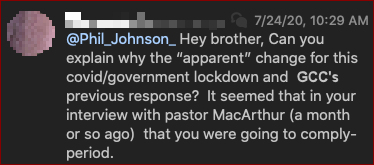 Thanks for the question. I'll answer candidly. Speaking for myself alone, I'll acknowledge that yes, my thinking on the question of the COVID-19 quarantine and Romans 13 has changed somewhat—or at least been refined, illuminated, qualified, and enriched. I've been forced by circumstances to rethink and amplify my answers carefully because of the government's relentless attempts to keep churches closed despite the fact that months have passed without the apocalyptic quotas of death and disease that were originally predicted. My original concern about the virus was clearly overblown. At the time, I needed to be cautious, because we could not possibly know how serious the threat really was. My concern now is for people whose need for fellowship and pastoral care is going unmet. I do have firsthand knowledge of how critical this emergency is.In the weeks since March several things happened that affect my perspective. For one thing, the California Governor's edicts have become increasingly onerous.He has told churches they should not have congregational singing.He wants to limit church attendance to 100 (even in a massive 3,000-seat auditorium).He says churches are "nonessential" while insisting that marijuana dispensaries, liquor stores, and casinos are vital businesses that must be kept open.Although he briefly showed signs of backing off the policy of church closures, he then immediately doubled down to try to force the mandatory re-closure of all places of worship "indefinitely" (even though there's no evidence churches have been hotspots for passing the virus).Meanwhile, government officials have not only permitted but actively encouraged mass demonstrations (including riots) for political causes.With all of that going on, I was forced to rethink my position on Romans 13. The elders of our church also realized the need for us to answer in greater detail the question of who has the authority to govern the doctrine, worship, and polity of the church. The elders' statement that was affirmed on July 23 and made public the following day is the result. It's a clarification and qualification of everything we have previously said about the duty imposed on us by Romans 13 and 1 Peter 2. Without denying that duty, we're endeavoring to explain biblically why those passages don't call for blind, automatic acquiescence to government overreach into church business.It is of course still the case that in a real and impending health crisis, the elders and pastors of a church may wisely decide to follow the recommendations of health officials with regard to protecting against dangerous contagions. That's precisely what we did at the start of the quarantine. Circumstances have changed, however, and we have adapted (and explained) our response accordingly.An observant person who has been following me might have noticed subtle shifts in my position since the quarantine began. I knew from the start that things might change if politicians began to use the health crisis in an opportunistic way. When explaining our position on Romans 13 several weeks ago, I wrote this: How long until the government-ordered quarantine is undeniably excessive, or we conclude that it's targeted persecution against our worship and therefore an illegal attempt to make us disobey Hebrews 10:25? That time may come, and when it does, we may have to implement the principle of Acts 5:29. The question of whether we have already passed that point is another subjective issue Thanks for the question. I'll answer candidly. Speaking for myself alone, I'll acknowledge that yes, my thinking on the question of the COVID-19 quarantine and Romans 13 has changed somewhat—or at least been refined, illuminated, qualified, and enriched. I've been forced by circumstances to rethink and amplify my answers carefully because of the government's relentless attempts to keep churches closed despite the fact that months have passed without the apocalyptic quotas of death and disease that were originally predicted. My original concern about the virus was clearly overblown. At the time, I needed to be cautious, because we could not possibly know how serious the threat really was. My concern now is for people whose need for fellowship and pastoral care is going unmet. I do have firsthand knowledge of how critical this emergency is.In the weeks since March several things happened that affect my perspective. For one thing, the California Governor's edicts have become increasingly onerous.He has told churches they should not have congregational singing.He wants to limit church attendance to 100 (even in a massive 3,000-seat auditorium).He says churches are "nonessential" while insisting that marijuana dispensaries, liquor stores, and casinos are vital businesses that must be kept open.Although he briefly showed signs of backing off the policy of church closures, he then immediately doubled down to try to force the mandatory re-closure of all places of worship "indefinitely" (even though there's no evidence churches have been hotspots for passing the virus).Meanwhile, government officials have not only permitted but actively encouraged mass demonstrations (including riots) for political causes.With all of that going on, I was forced to rethink my position on Romans 13. The elders of our church also realized the need for us to answer in greater detail the question of who has the authority to govern the doctrine, worship, and polity of the church. The elders' statement that was affirmed on July 23 and made public the following day is the result. It's a clarification and qualification of everything we have previously said about the duty imposed on us by Romans 13 and 1 Peter 2. Without denying that duty, we're endeavoring to explain biblically why those passages don't call for blind, automatic acquiescence to government overreach into church business.It is of course still the case that in a real and impending health crisis, the elders and pastors of a church may wisely decide to follow the recommendations of health officials with regard to protecting against dangerous contagions. That's precisely what we did at the start of the quarantine. Circumstances have changed, however, and we have adapted (and explained) our response accordingly.An observant person who has been following me might have noticed subtle shifts in my position since the quarantine began. I knew from the start that things might change if politicians began to use the health crisis in an opportunistic way. When explaining our position on Romans 13 several weeks ago, I wrote this: How long until the government-ordered quarantine is undeniably excessive, or we conclude that it's targeted persecution against our worship and therefore an illegal attempt to make us disobey Hebrews 10:25? That time may come, and when it does, we may have to implement the principle of Acts 5:29. The question of whether we have already passed that point is another subjective issue |
by Phil Johnson
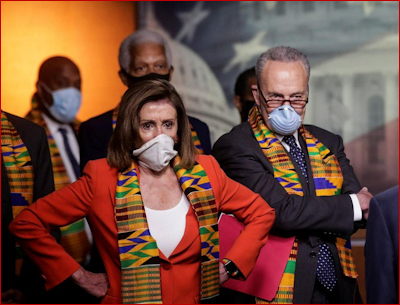 BTW, "Get Woke or get out" is no way to promote Christian unity. BTW, "Get Woke or get out" is no way to promote Christian unity. ohn McWhorter, professor of linguistics, comparative religion, music history, and Americana at Columbia University has been pointing out (since at least 2015) that Woke anti-racism is a religion. McWhorter says, "When someone attests to his white privilege with his hand up in the air, palm outward . . . the resemblance to testifying in church need not surprise. Here, the agnostic or atheist American who sees fundamentalists and Mormons as quaint reveals himself as, of all things, a parishioner."Wokeism satiates the religious cravings of the human spirit for people who have rejected conventional expressions of theistic worship. It has therefore become the current orthodoxy in the academic world and the official religion of secular society.It has also become a kind of plaything for evangelicals who crave the world's admiration and approval—and who don't mind dabbling in syncretism. This is a frivolous and dangerous experiment, however, because no one who holds any real evangelical convictions can ever be truly Woke. Too many of Wokeism's cardinal tenets flatly contradict biblical principles. The truly Woke are militantly pro-abortion; devoted to the LGBTQAFLCIO agenda, rabid socialists, and high-handed secularists. Pure Wokeism is openly hostile to any whiff of evangelicalism.Wokeism has become a kind of plaything for evangelicals who crave the world's admiration and approval—and who don't mind dabbling in syncretism.Plus, Woke religion has a very insular creed. Soul liberty is antithetical to their fundamental convictions. They have a deep and abiding hatred for every worldview, idea, or person that challenges any point of their authorized credo. Indeed, to challenge Wokeism on any point or at any level whatsoever is deemed damnable heresy. Wokeism ironically fosters this extreme illiberality in the name of "tolerance and diversity."Wokeism is as narrow-minded as any brand of fundamentalism—and getting more narrow every day. Every article of faith must be formally affirmed and faithfully adhered to. A catalogue of insider jargon signals other adherents that you too are Woke. But there are forbidden words that must be carefully avoided on pain of excommunication. And the list of taboo expressions is constantly being revised and expanded, so you must stay conversant with the approved vocabulary or risk being publicly shamed and shunned.In addition to the strict cardinal dogmas, Wokeism has its own sacraments and rituals, high priests, saints, and martyrs—even a kind of hymnology. The flavor of Woke rhetoric is homiletical rather than scholarly; it's a sermonic appeal to deep emotions, utilizing personal testimony and a carefully-crafted narrative (the Woke mythology) rather than statistics.It's an odd religion—teaching people to nurse grudges, cast blame, cultivate ill will against whole people groups, and deepen that personal sense of resentment. But it is nonetheless fully religious in character, for all the reasons noted.The push to spread Woke doctrines therefore has all the characteristics of a religious campaign—a crusade to win converts by any means possible. Conversion conveys a moral standing that non-converts (the uncooperative, unwashed, unWoke) don't have. It's a limited veneer of virtue that offers a provisional reprieve—nothing like full forgiveness. (More on that later.) But it entitles the penitent to join the Woke in heaping full-throated condemnation on the unWoke.To a devotee of Wokeness, being unWoke is tantamount to being a rank heathen or an evil infidel. They see Wokeness not merely as a matter of politics; it is the only righteous worldview, and it must be embraced with pure religious fervor. Indeed, Woke anti-racism has quite literally become a point of religious doctrine so important that even in the minds of the kinda-Woke evangelicals it has upstaged and eclipsed abortion as the number one moral crisis in America. ohn McWhorter, professor of linguistics, comparative religion, music history, and Americana at Columbia University has been pointing out (since at least 2015) that Woke anti-racism is a religion. McWhorter says, "When someone attests to his white privilege with his hand up in the air, palm outward . . . the resemblance to testifying in church need not surprise. Here, the agnostic or atheist American who sees fundamentalists and Mormons as quaint reveals himself as, of all things, a parishioner."Wokeism satiates the religious cravings of the human spirit for people who have rejected conventional expressions of theistic worship. It has therefore become the current orthodoxy in the academic world and the official religion of secular society.It has also become a kind of plaything for evangelicals who crave the world's admiration and approval—and who don't mind dabbling in syncretism. This is a frivolous and dangerous experiment, however, because no one who holds any real evangelical convictions can ever be truly Woke. Too many of Wokeism's cardinal tenets flatly contradict biblical principles. The truly Woke are militantly pro-abortion; devoted to the LGBTQAFLCIO agenda, rabid socialists, and high-handed secularists. Pure Wokeism is openly hostile to any whiff of evangelicalism.Wokeism has become a kind of plaything for evangelicals who crave the world's admiration and approval—and who don't mind dabbling in syncretism.Plus, Woke religion has a very insular creed. Soul liberty is antithetical to their fundamental convictions. They have a deep and abiding hatred for every worldview, idea, or person that challenges any point of their authorized credo. Indeed, to challenge Wokeism on any point or at any level whatsoever is deemed damnable heresy. Wokeism ironically fosters this extreme illiberality in the name of "tolerance and diversity."Wokeism is as narrow-minded as any brand of fundamentalism—and getting more narrow every day. Every article of faith must be formally affirmed and faithfully adhered to. A catalogue of insider jargon signals other adherents that you too are Woke. But there are forbidden words that must be carefully avoided on pain of excommunication. And the list of taboo expressions is constantly being revised and expanded, so you must stay conversant with the approved vocabulary or risk being publicly shamed and shunned.In addition to the strict cardinal dogmas, Wokeism has its own sacraments and rituals, high priests, saints, and martyrs—even a kind of hymnology. The flavor of Woke rhetoric is homiletical rather than scholarly; it's a sermonic appeal to deep emotions, utilizing personal testimony and a carefully-crafted narrative (the Woke mythology) rather than statistics.It's an odd religion—teaching people to nurse grudges, cast blame, cultivate ill will against whole people groups, and deepen that personal sense of resentment. But it is nonetheless fully religious in character, for all the reasons noted.The push to spread Woke doctrines therefore has all the characteristics of a religious campaign—a crusade to win converts by any means possible. Conversion conveys a moral standing that non-converts (the uncooperative, unwashed, unWoke) don't have. It's a limited veneer of virtue that offers a provisional reprieve—nothing like full forgiveness. (More on that later.) But it entitles the penitent to join the Woke in heaping full-throated condemnation on the unWoke.To a devotee of Wokeness, being unWoke is tantamount to being a rank heathen or an evil infidel. They see Wokeness not merely as a matter of politics; it is the only righteous worldview, and it must be embraced with pure religious fervor. Indeed, Woke anti-racism has quite literally become a point of religious doctrine so important that even in the minds of the kinda-Woke evangelicals it has upstaged and eclipsed abortion as the number one moral crisis in America. Wokeism is a nasty religious cult. Its votaries routinely declare people guilty for the sins of others, elicit rote confessions, and then refuse to offer absolution. They define sin mainly (if not entirely) as a horizontal offense—but not necessarily even a personal offense. You are guilty mainly for what your ancestors may have done. And even if your ancestors were themselves poor subsistence farmers who never oppressed anyone, if other members of your ethnic group did, you are made to bear the guilt for that. Guilt is therefore a corporate responsibility, apportioned differently to different ethnicities.If you don't have the right kind of victim status or skin color, it would be utterly foolish for you even to think of asking for forgiveness. Still, you must confess the guilt you bear by kneeling and reciting the prescribed confession. And if you don't do this, your refusal to genuflect on command will mark you as a fascist. The fact that you dissent from the received opinion intensifies the criminality you inherited when you were born into the wrong ethnic group. Preachers of the Woke doctrines will do everything they can to make sure you are shunned by polite society. Apologize publicly and you will merely be mocked (and subjected to endless re-indoctrination). But if you remain stubbornly unWoke, those who are Woke will scold and harass you publicly, relentlessly, trying to get you fired from your job.Or worse. Wokeism is a nasty religious cult. Its votaries routinely declare people guilty for the sins of others, elicit rote confessions, and then refuse to offer absolution. They define sin mainly (if not entirely) as a horizontal offense—but not necessarily even a personal offense. You are guilty mainly for what your ancestors may have done. And even if your ancestors were themselves poor subsistence farmers who never oppressed anyone, if other members of your ethnic group did, you are made to bear the guilt for that. Guilt is therefore a corporate responsibility, apportioned differently to different ethnicities.If you don't have the right kind of victim status or skin color, it would be utterly foolish for you even to think of asking for forgiveness. Still, you must confess the guilt you bear by kneeling and reciting the prescribed confession. And if you don't do this, your refusal to genuflect on command will mark you as a fascist. The fact that you dissent from the received opinion intensifies the criminality you inherited when you were born into the wrong ethnic group. Preachers of the Woke doctrines will do everything they can to make sure you are shunned by polite society. Apologize publicly and you will merely be mocked (and subjected to endless re-indoctrination). But if you remain stubbornly unWoke, those who are Woke will scold and harass you publicly, relentlessly, trying to get you fired from your job.Or worse.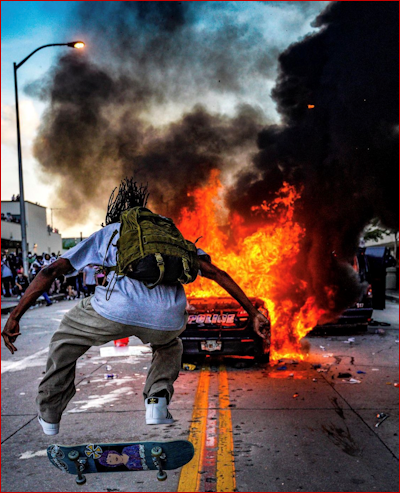 On the other hand, if you are a cop, a civic leader, or a Christian, kneeling and accepting the Woke credo will do nothing to make you any less worthy of public contempt and censure.After all, this is a religion that has no doctrine of atonement, no concept of forgiveness, and no possibility of real redemption. The recent demonstrations and riots made clear that no matter how frequently they use the word, reconciliation is not the real goal of Wokeism.In short, the Woke worldview is impossible to blend with gospel truth—and its inevitable drift will take today's wanna-be-Woke evangelicals exactly where the social gospel of Walter Rauschenbusch took the mainline denominations in the twentieth century: into rank theological liberalism and unbelief.The notion that the gospel can be improved by blending it with Wokeism is sheer folly anyway. The Woke worldview is rooted in secularism—and arguably, Marxism. Its central claims and distinctive jargon are taken not from Scripture but from secular political discourse. It is a canon of doctrine deliberately designed to provoke conflict, prolong resentment, and foster bitterness between different ethnicities. It encourages people to be offended by things that never actually happened to them—while blaming others for sins they did not actually commit. It doles out guilt and shame rather than grace and redemption. Though it is promoted by people who say they oppose ethnic strife, it is a blatantly racist worldview, condemning entire ethnic groups for sins that were committed generations ago by people long dead.All of that hits at the heart of the gospel message of forgiveness, grace, oneness in Christ, and unity in the church. It is as anti-Christian as every other cult or false religion, and faithful followers of Christ should recognize that. On the other hand, if you are a cop, a civic leader, or a Christian, kneeling and accepting the Woke credo will do nothing to make you any less worthy of public contempt and censure.After all, this is a religion that has no doctrine of atonement, no concept of forgiveness, and no possibility of real redemption. The recent demonstrations and riots made clear that no matter how frequently they use the word, reconciliation is not the real goal of Wokeism.In short, the Woke worldview is impossible to blend with gospel truth—and its inevitable drift will take today's wanna-be-Woke evangelicals exactly where the social gospel of Walter Rauschenbusch took the mainline denominations in the twentieth century: into rank theological liberalism and unbelief.The notion that the gospel can be improved by blending it with Wokeism is sheer folly anyway. The Woke worldview is rooted in secularism—and arguably, Marxism. Its central claims and distinctive jargon are taken not from Scripture but from secular political discourse. It is a canon of doctrine deliberately designed to provoke conflict, prolong resentment, and foster bitterness between different ethnicities. It encourages people to be offended by things that never actually happened to them—while blaming others for sins they did not actually commit. It doles out guilt and shame rather than grace and redemption. Though it is promoted by people who say they oppose ethnic strife, it is a blatantly racist worldview, condemning entire ethnic groups for sins that were committed generations ago by people long dead.All of that hits at the heart of the gospel message of forgiveness, grace, oneness in Christ, and unity in the church. It is as anti-Christian as every other cult or false religion, and faithful followers of Christ should recognize that. |
by Phil Johnson
  his guy, angry that Grace Community Church yielded to the 9th Circuit Court's ruling banning church meetings in California this weekend, Tweets at me: "An unjust law need not be followed." his guy, angry that Grace Community Church yielded to the 9th Circuit Court's ruling banning church meetings in California this weekend, Tweets at me: "An unjust law need not be followed."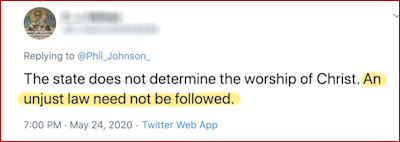 I'm appalled at how many people who profess to believe Scripture echo that sentiment. Nero was emperor when Paul wrote Romans 13:1-7: "Let every person be subject to the governing authorities. For there is no authority except from God, and those that exist have been instituted by God. . . ." First Peter 2:13 was written to people suffering unjustly. ("Be subject for the Lord's sake to every human institution, whether it be to the emperor as supreme, or to governors as sent by him...")Peter goes on to say: "Be subject . . . also to the unjust. For this is a gracious thing, when, mindful of God, one endures sorrows while suffering unjustly" (vv. 18-19). Indeed, "to this [unjust suffering] you have been called, because Christ also suffered for you, leaving you an example, so that you might follow in his steps." (v. 21). When someone in authority over us treats us unjustly, the example we are to follow was set for us by Christ, who simply "continued entrusting himself to him who judges justly" (v. 23).The only exception to this principle is when the one in authority instructs us to sin. Then "we must obey God rather than men" (Acts 5:29).So does a government-mandated quarantine ask us to violate Hebrews 10:25 ("not neglecting to meet together"), or is the quarantine in keeping with the principle of Leviticus 13-14, where quarantines are expressly mandated?The answer to that question may vary according to where we live. Quarantining people in the midst of a pandemic is a legitimate prerogative of government. How long the quarantine should last and who should be exempted are questions that don't have clear, fixed answers. The severity and duration of the pandemic determines what's reasonable or not. We may or may not agree with how the quarantine is being implemented (I certainly do not), but we have a clear duty to submit unless we are being asked to sin.How long until the government-ordered quarantine is undeniably excessive, or we conclude that it's targeted persecution against our worship and therefore an illegal attempt to make us disobey Hebrews 10:25? That time may come, and when it does, we may have to implement the principle of Acts 5:29. The question of whether we have already passed that point is another subjective issue, but it's clear that among believers—in the church itself—there is not yet consensus on whether the quarantine has gone too far.Nevertheless, if you hang out on Twitter or Facebook, you may have noticed that there are countless people in the evangelical community who refuse to regard any of the above questions as matters of conscience. They believe the answers are perfectly obvious. They are eager to tell you what you and your church ought to be doing. They are locked and loaded with vituperation for anyone who sees matters differently. Two camps of them have squared off against each other—hordes of angry Karens at opposite extremes, all of whom disagree with the position I've outlined above. Some of them are scolding us for thinking Romans 13 and 1 Peter 2 actually apply in today's circumstances. The others are berating us for wanting to resume public worship ASAP.Sorry, but in the words of Martin Luther, here I stand. I can do no other. I cannot and will not recant anything, for to go against conscience is neither right nor safe. God help us. I'm appalled at how many people who profess to believe Scripture echo that sentiment. Nero was emperor when Paul wrote Romans 13:1-7: "Let every person be subject to the governing authorities. For there is no authority except from God, and those that exist have been instituted by God. . . ." First Peter 2:13 was written to people suffering unjustly. ("Be subject for the Lord's sake to every human institution, whether it be to the emperor as supreme, or to governors as sent by him...")Peter goes on to say: "Be subject . . . also to the unjust. For this is a gracious thing, when, mindful of God, one endures sorrows while suffering unjustly" (vv. 18-19). Indeed, "to this [unjust suffering] you have been called, because Christ also suffered for you, leaving you an example, so that you might follow in his steps." (v. 21). When someone in authority over us treats us unjustly, the example we are to follow was set for us by Christ, who simply "continued entrusting himself to him who judges justly" (v. 23).The only exception to this principle is when the one in authority instructs us to sin. Then "we must obey God rather than men" (Acts 5:29).So does a government-mandated quarantine ask us to violate Hebrews 10:25 ("not neglecting to meet together"), or is the quarantine in keeping with the principle of Leviticus 13-14, where quarantines are expressly mandated?The answer to that question may vary according to where we live. Quarantining people in the midst of a pandemic is a legitimate prerogative of government. How long the quarantine should last and who should be exempted are questions that don't have clear, fixed answers. The severity and duration of the pandemic determines what's reasonable or not. We may or may not agree with how the quarantine is being implemented (I certainly do not), but we have a clear duty to submit unless we are being asked to sin.How long until the government-ordered quarantine is undeniably excessive, or we conclude that it's targeted persecution against our worship and therefore an illegal attempt to make us disobey Hebrews 10:25? That time may come, and when it does, we may have to implement the principle of Acts 5:29. The question of whether we have already passed that point is another subjective issue, but it's clear that among believers—in the church itself—there is not yet consensus on whether the quarantine has gone too far.Nevertheless, if you hang out on Twitter or Facebook, you may have noticed that there are countless people in the evangelical community who refuse to regard any of the above questions as matters of conscience. They believe the answers are perfectly obvious. They are eager to tell you what you and your church ought to be doing. They are locked and loaded with vituperation for anyone who sees matters differently. Two camps of them have squared off against each other—hordes of angry Karens at opposite extremes, all of whom disagree with the position I've outlined above. Some of them are scolding us for thinking Romans 13 and 1 Peter 2 actually apply in today's circumstances. The others are berating us for wanting to resume public worship ASAP.Sorry, but in the words of Martin Luther, here I stand. I can do no other. I cannot and will not recant anything, for to go against conscience is neither right nor safe. God help us. |
by Phil Johnson
  ne of the questions prompted by the quarantine is about "virtual communion." After all, in lieu of regular worship services, we are listening online every Sunday while our pastor preaches from the pulpit of the church. So why not have a kind of virtual communion service, where we all take the elements simultaneously in the privacy of our homes?Five times in Paul's instructions regarding the Lord's Table, he uses the phrase "when you come together as a church" or its equivalent (1 Corinthians 11:17, 18, 20, 33, 34). In verse 34 he expressly contrasts "eat[ing] at home" with the act of eating the bread and drinking the cup as a church body "when you come together." Clearly, the communion ordinance is supposed to be shared by the gathered assembly of the church collectively, not taken by individuals in solitude. It is not a private sacrament.We might sometimes serve communion with a small group of 5-10 church members gathering at the bedside of someone who is homebound or permanently confined to a nursing home or long-term health-care facilities. But there's a significant difference in a case like that—because you have a subset of the church in genuine communion together, contrasted with isolated people in quarantine who serve themselves (which destroys the symbolism of the Supper).I agree that extraordinary times do sometimes call for extraordinary measures, and I understand the desire to be flexible in a time of emergency, so although I don't approve and wouldn't participate, I wouldn't necessarily inveigh publicly against a church that offered a "virtual communion service." There may be some well-meaning church leaders who sincerely believe some kind of makeshift online Eucharistic ceremony (sans any actual communion among the saints) is better than none at all. They are wrong about that. But if done anyway, such dramatic revision to the sacrament needs (at the very least) to be carefully and thoroughly explained, along with clear instructions telling participants that this is a temporary measure only, a one-time exception to the normal practice, and it should not change how the church normally observes the Lord's Table or regards its significance. ne of the questions prompted by the quarantine is about "virtual communion." After all, in lieu of regular worship services, we are listening online every Sunday while our pastor preaches from the pulpit of the church. So why not have a kind of virtual communion service, where we all take the elements simultaneously in the privacy of our homes?Five times in Paul's instructions regarding the Lord's Table, he uses the phrase "when you come together as a church" or its equivalent (1 Corinthians 11:17, 18, 20, 33, 34). In verse 34 he expressly contrasts "eat[ing] at home" with the act of eating the bread and drinking the cup as a church body "when you come together." Clearly, the communion ordinance is supposed to be shared by the gathered assembly of the church collectively, not taken by individuals in solitude. It is not a private sacrament.We might sometimes serve communion with a small group of 5-10 church members gathering at the bedside of someone who is homebound or permanently confined to a nursing home or long-term health-care facilities. But there's a significant difference in a case like that—because you have a subset of the church in genuine communion together, contrasted with isolated people in quarantine who serve themselves (which destroys the symbolism of the Supper).I agree that extraordinary times do sometimes call for extraordinary measures, and I understand the desire to be flexible in a time of emergency, so although I don't approve and wouldn't participate, I wouldn't necessarily inveigh publicly against a church that offered a "virtual communion service." There may be some well-meaning church leaders who sincerely believe some kind of makeshift online Eucharistic ceremony (sans any actual communion among the saints) is better than none at all. They are wrong about that. But if done anyway, such dramatic revision to the sacrament needs (at the very least) to be carefully and thoroughly explained, along with clear instructions telling participants that this is a temporary measure only, a one-time exception to the normal practice, and it should not change how the church normally observes the Lord's Table or regards its significance. In practice, however, "virtual communion" services do confuse people—or worse. Saddleback Church, for example, has embraced the idea of "virtual communion." In an email message to church members during Passion Week, Rick Warren wrote, "Last weekend, thousands of our members participated in this tradition at home in our first online Communion in the history of this church. Many people just used what they had: cheese crackers, pancake bits, and various juices. It's hilarious seeing on social media all the things our members used!"They have In practice, however, "virtual communion" services do confuse people—or worse. Saddleback Church, for example, has embraced the idea of "virtual communion." In an email message to church members during Passion Week, Rick Warren wrote, "Last weekend, thousands of our members participated in this tradition at home in our first online Communion in the history of this church. Many people just used what they had: cheese crackers, pancake bits, and various juices. It's hilarious seeing on social media all the things our members used!"They have  literally made a mockery of the Lord's Table—the very kind of thing the apostle was rebuking the Corinthians for in 1 Corinthians 11.So the best course of action—and what Grace Community Church's elders will be doing—is to wait to serve communion until the church can legitimately assemble. Better to forego the ordinance altogether during the quarantine rather than risk confusing people about the meaning of the Lord's Table and how it is normally to be administered. literally made a mockery of the Lord's Table—the very kind of thing the apostle was rebuking the Corinthians for in 1 Corinthians 11.So the best course of action—and what Grace Community Church's elders will be doing—is to wait to serve communion until the church can legitimately assemble. Better to forego the ordinance altogether during the quarantine rather than risk confusing people about the meaning of the Lord's Table and how it is normally to be administered. |
Your weekly Dose of SpurgeonThe
|
Your weekly Dose of SpurgeonThe
|
Your weekly Dose of SpurgeonThe
|



 Links
Links  Articles
Articles  Blogs
Blogs  Videos
Videos  News
News  Colors
Colors 

 New links
New links

